Chapter 3.1 The Plate of Gold
Textbook Questions and Answers
Warming Up:
1. Stories can be told even in the form of poetry. Such poems are called Narrative poems. Narrative poems do not always follow rhythmic patterns ola fixed rhyme scheme. Such poems are written ¡na style culled ‘Free Verse.’Recall and name some narrative poems you have done/read earlier.
Answer:
Students can discuss and think about the narrative poems in Free Verse done/read earlier e.g. ‘Vocation’ by Rabindranath Tagore.
2. Read the poem below and fill in the gaps, choosing appropriate pairs of rhyming words, to make them meaningful.
little things
Little drops of water,
Little groins of …………
Make the mighty ocean
And the pleasant …………
Thus the little minutes,
Humble though they ………..
Make the mighty ages
Of …………
Little deeds of kindness,
Little words of ………..
Make this earth an Eden,
Like the heaven a ………..
Answer:
Little things
Little drops of water,
Little grains of sand
Make the mighty ocean
And the pleasant land.
Thus the little minutes,
Humble though they be,
Make the mighty ages
Of eternity.
Little deeds of kindness,
Little words of love
Make this earth an Eden,
Like the heaven above.
What important messue does the aboe poem convey?
Answer:
It conveys the message that even little acts and gestures are important.We must not think that something is unimportant or insignificant just because it is small.
1. Pick out words from the poem to complete the sentences meaningfully:
Question a.
Stephen Hawking was a ________(famous) Astrophysicist.
Answer:
Renowned.
Question b.
The Government made a ________(announcement) about their new taxation policy.
Answer:
Proclamation.
Question c.
Everyone stood _______ (horrified) when the terrible accident took place.
Answer:
aghast.
Question d.
She _________(bargained) with the hawker to reduce the price.
Answer:
wrangled.
Question e.
Handicapped people should never be ______ (ignored and avoided)
Answer:
shunned.
2. Make a list of archaic words from the poem and give their modern equivalents.
Answer:
Archaic words | Modern equivalents |
Wondrous | wonderful |
Loveth | loves |
Dropt | dropped |
writ | written |
bestowed | presented |
3. Rearrange the following in the proper order and insert them into a flow chart as per the poem:
(a) The plate turned to lead, when it was gifted to false-hearted claimants.
(b) Many claimants donated their wealth to receive the plate of gold.
(e) For almost two years, no clQimants received the plate of gold.
(d) A plate of gold fell in a temple from Heaven.
(e) The peasant offered comfort and courage to a blind miserable beggar. whom all had ignored.
(f) The priests announced that the one who loved God most of all, would receive the gift from Heaven.
(g) When the priest gave the plate of gold to that peasant, it shone with thrice its lustre.
(h) A simple peasant, who had nothing to offer, came to that temple.
Answer:
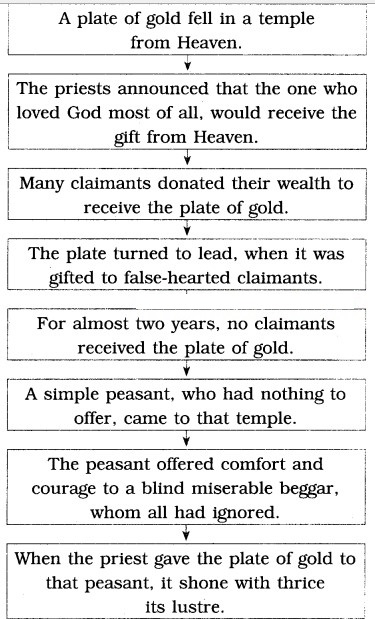
4. Which two sayings about God are conveyed through the poem bThe Plate of Gold’?
(a) God helps those, who help themselves.
(b) God loves those, who love their fellow beings.
(c) God loves those, who give away their wealth, to please Him.
(d) Service to mankind is service to God.
Answer:
(b) God loves those, who love their fellow beings.
(d) Service to mankind is service to God.
5. ‘But the peasant bowed and prayed to God ‘ What could he have prayed for?
Answer:
The peasant must have prayed for the well-being of all human beings and asked God to help everyone to bear their troubles bravely.
6. Imagine that you are the peasant. Compose a short prayer to God, after having received the plate of gold. Write it using stylish handwriting.
7. Read other poems by Leigh Hunt. especially ‘Abou Ben Adhem’. Compare the messages in that poem with those in ‘The Plate of Gold’. What do you
observe?
Additional Important Questions and Answers
Complete the web:
Question 1.
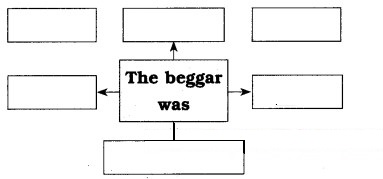
Answer:
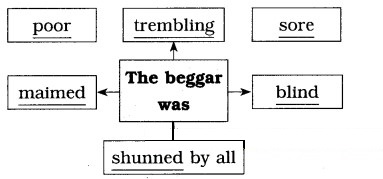
Name the following:
Question 1.
They made a proclamation:
Answer:
the priests
Question 2.
A gift from heaven:
Answer:
a plate of gold
Question 3.
People assembled at this time:
Answer:
midday
Question 4.
The plate became this again when it touched the floor:
Answer:
gold
Complete the following:
Question 1.
The plate of gold could be claimed by _______.
Answer:
the person who loved his fellow beings the best
Question 2.
The priests gifted the plate of gold to ______.
Answer:
a man who within the year had distributed his whole estate among the poor
Question 3.
The poor peasant offered the blind beggar _____.
Answer:
sincere pity and love.
Answer the following:
Question 1.
What magical occurrence shocked the people?
Answer:
The golden plate turned to lead when touched by the man, and became gold again when it fell on the floor.
This magical occurrence shocked the people.
Question 2.
Pick out an example of Alliteration from the extract.
Answer:
‘A wondrous plate of gold, whereon these words were writ’. Repetition of the sound of ‘w’.
Question 3.
Pick out an example of Simile from the extract.
Answer:
‘The news ran as swift as light.’ The movement of the news is directly compared to the movement of light.
Question 4.
Pick out an example of Onomatopoeia from the extract.
Answer:
‘……… drop it clanging on the floor’. The word ‘clanging’ indicates sound.
Question 5.
Pick out an example of Inversion from the extract.
Answer:
‘……… the priests in solemn council sat and heard’. The correct prose order is: the priests sat and heard in solemn council.
Write if the following sentences are True or False:
Question 1.
The priests did not award the plate to anyone.
Answer:
False
Question 2.
There were very few beggars near the temple gate.
Answer:
False
Question 3.
The beggars got a lot of alms.
Answer:
True
Question 4.
The peasant was well aware of the race for the plate.
Answer:
False
Give reasons:
Question 1.
Many beggars had collected outside the temple.
Answer:
The golden plate from Heaven was to be bestowed on the person who loved his fellow beings the most. The people who came to the temple would want to prove their love by giving alms. Hence many beggars had collected outside the temple to receive the bountiful alms.
Question 2.
The pilgrims to the temple showered coins on the beggars.
Answer:
The golden plate from Heaven was to be bestowed on the person who loved his fellow beings the most. In order to prove that their love was the best and hence they were worthy of the plate, the pilgrims to the temple showered coins on the beggars.
Question 3.
What did the pilgrims fail to do?
Answer:
The pilgrims failed to see the unhappiness in the eyes of the beggars.
Match the adjectives in Column A with the nouns in Column B:
Question 1.
A | B |
(1) maimed | (a) hands |
(2) outstretched | (b) pity |
(3) simple | (c) beggars |
(4) sweet | (d) peasant |
Answer:
- maimed – beggars
- outstretched – hands
- simple – peasant
- sweet – pity
Activities based on Poetic Devices:
Question 1.
Pick out an example of Inversion from the extract.
Answer:
‘So for another twelve months sat the priests and judged.’ The correct prose order is: So for another twelve months the priests sat and judged.
Question 2.
Pick out an example of Repetition from the extract.
Answer:
‘Thrice they awarded thrice did Heaven refuse the gift.’ The word thrice is repeated for emphasis and rhythm.
Complete the following:
Question 1.
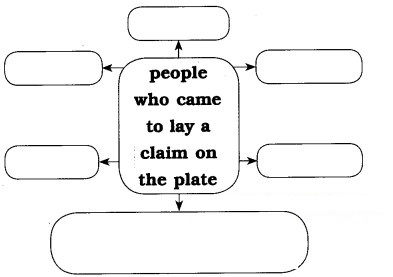
Answer:
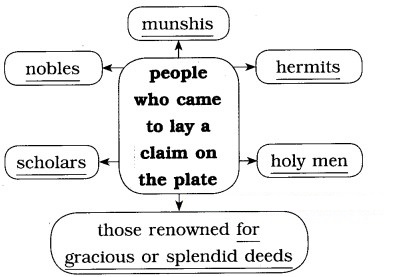
Give reasons:
Question 1.
God had chosen the simple peasant as the most deserving of the plate of gold.
Answer:
The simple peasant offered the blind beggar sincere sympathy and love, which came from the depth of his heart.
He had no hidden motive for what he did. Hence God chose him as the most deserving of the plate of gold.
Question 2.
‘But the peasant bowed and prayed to God What could he have prayed for?
Answer:
The peasant must have prayed for the well-being of all human beings, and asked God to help everyone to bear their troubles bravely
Question 3.
Make a list of archaic words from the extract and give their modem equivalents:
Answer:
Archaic words | Modem equivalents |
thou | You |
thy | Your |
o’er | Over |
thine | yours |
lovest | loves |
Question 4.
Pick out an example of Inversion from the extract.
Answer:
And took both palms in his, and softly said.
The correct prose order should be: And took both palms in his, and said softly
Analysis/Appreciation of the Poem
Answer:
- Poem and poet: The Plate of j Gold’ by James Henry Leigh Hunt.
- Theme: God loves those who love their fellow beings Service to mankind is service to God.
- Tone: A narrative, serious and moralistic.
- Structure and stanzas: No uniformity in stanzas or the length of lines.
- Rhyme and Rhythm: No rhyme scheme or rhythm; free verse.
- Language and Imagery: Archaic language; plenty of imagery, especially when describing the peasant and the beggar.
- Figures of Speech: Inversion, Repetition, Onomatopoeia, and Simile.